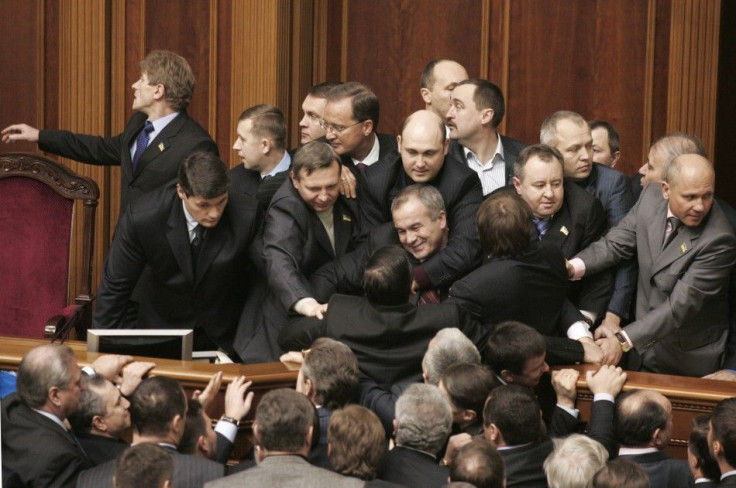Ukraine: Riots Erupt In Kiev Over Russian Language Bill

Riots broke out in the Ukrainian capital of Kiev Wednesday as activists protested the adoption of a bill that would allow the use of the Russian language in some Ukrainian institutions.
About 2,000 protesters gathered outside a government building to denounce the bill, according to the Associated Press. Riot police in bulletproof vests arrived on the scene; rocks were thrown, shields were raised and pepper spray was used by both sides.
The bill, which passed Parliament but has not yet been signed into law by President Viktor Yanukovych, would allow courts, schools and other government institutions in Russian-speaking areas to use the Russian language exclusively. Ukrainian would remain the country's official language.
Opponents argue that the bill would endanger the Ukrainian language and distance Ukraine from the European Union.
Resistance was strong in Parliament, just as it was on the streets. In fact, debates over the Russian language issue erupted into a prolonged physical fight on the floor just last month.
This week, the bill's supporters passed the measure late on Tuesday night in the absence of several opponents. Parliament Speaker Volodymyr Lytvyn was one of those not in attendance. Upon hearing the news on Wednesday, he abruptly resigned and called the vote illegitimate.
The vehement debate illustrates a central conflict within the former Soviet state: whether Ukraine should ally itself with Russia or the West.
The historical relationship between Russia and Ukraine is a tangled one, especially with the strong economic links affected by their natural gas trade. Russia is a major producer of the resource, but it relies on Ukrainian pipelines to get the product out to market. This economic interdependency has strained already tense relations as Ukraine weighs long-held alliances against modern economic imperatives.
The knotty situation came to a head after Ukraine's Orange Revolution of 2004 and 2005, when pro-Western President Viktor Yushchenko and Prime Minister Yulia Tymoshenko were elected and the relationship between Moscow and Kiev deteriorated.
But in 2010, Yanukovych was elected to the presidency. The Kremlin-allied politician from eastern Ukraine took strides to dial back on Ukraine's latest westward pivot, and Tymoshenko was jailed on corruption charges involving Russian gas deals. The popular opposition figure is still being detained, and appeals against her prison sentence have been postponed.
Yanukovych's pro-Russia stance was mitigated by his May decision to ramp up Ukraine's own natural gas production by 25 percent over three years, in partnership with Western oil companies. The decision was seen as an affront to the Kremlin, though Yanukovych used conciliatory rhetoric to avoid any major diplomatic upheaval.
Now, he is once again caught in the middle of the Russia debate. Signing the Russian language bill would put Yanukovych in good standing with Ukraine's many Russian speakers and strengthen his ties to Moscow, but the pro-Western opposition is enraged.
The Parliament officials who pushed the Russian language bill through on Tuesday night are political allies of Yanukovytch, but the president has not said whether he will sign the bill.
Further complicating matters is the fact that Speaker Lytvyn's signature was necessary for the bill to advance to the president's desk, according to protocol. In light of is his sudden resignation, the situation may drag out even longer as protests continue on the streets of Kiev.
© Copyright IBTimes 2024. All rights reserved.












